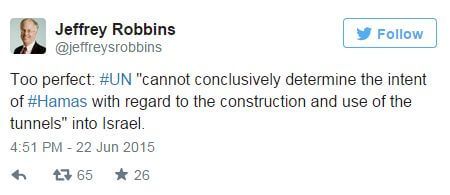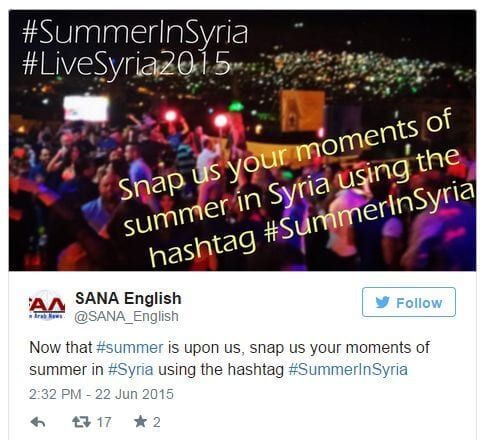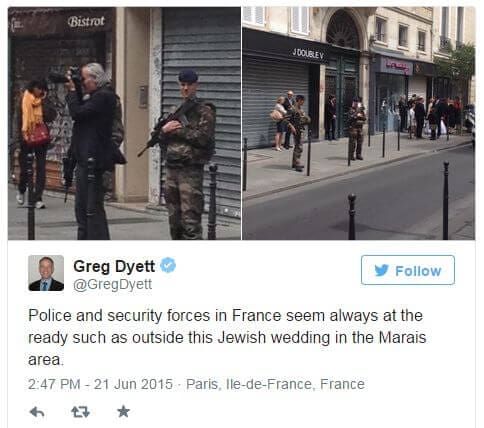Today’s Top Stories
1. Israel and the mainstream media react to the UN report on the Gaza war. For more on the fallout and commentary see below.
2. Haaretz: In a secret meeting in Rome, Israeli and Turkish officials renewed reconciliation talks. Ties between Jerusalem and Ankara broke down in 2010 after the Mavi Marmara incident.
It’s hard to tell where this might go. Turkey’s approach to Israel may be softening due to the ruling AK Party losing its outright parliamentary majority. Ironically, the talks are coming just ahead of another Gaza flotilla soon to depart from Greece.
3. Israeli Druze ambushed another IDF ambulance ferrying injured Syrian rebels, killing one, and injuring the other. Two other Israeli soldiers were also hurt in the attack.
The Druze believe the Syrian rebels being treated in Israel may be from the Al-Qaida-affiliated Nusra Front, which is threatening Syrian Druze communities. The IDF denied that the Syrians were jihadists. It’s the second Druze attack on an ambulance in the last 24 hours. See YNet and Times of Israel coverage. Meanwhile, local Druze leaders say Lebanese terrorist Samir Quntar’s inciting Golan Druze to violence.
And Syria’s reaction to the lynching?
4. The Druze in the News: A misconception about the Druze, the Jews, and Israel gets cleared up.
5. HR Radio: “Shooting Teenagers” and Other Hostile Headlines: HonestReporting’s Yarden Frankl discussed coverage of the Schabas report and other media fails. Click below to hear the full interview on the Voice of Israel.
Schabas Report: The Fallout and Commentary
• Israel to launch diplomatic and P.R. campaign against the UN Human Rights Council’s eventual vote on adopting the Schabas report. YNet explains what’s in store and what’s at stake.
Behind the scene talks with key players in the UNHRC have already begun, but if adopted by the council the report will be passed onto the UN General Assembly, as occurred with the infamous Goldstone Report in wake of a previous Gaza conflict in 2009, or Secretary General Ban Ki-moon will be asked directly to monitor its implementation.
The council is scheduled to discuss the report next week. But see Raphael Ahren‘s take on how far the Schabas report is likely to go and why it’s unlikely to get any Israelis dragged off to the International Criminal Court.
• The Jerusalem Post‘s legal affairs correspondent, Yonah Bob, breaks down the Schabas report. In a separate piece, he explains why the Schabas report is more sophisticated than the Goldstone report.
. . . whereas the International Criminal Court in 2008- 9 was just a distant threat, it now sees the Palestinians as having a state that can officially file war crimes complaints and is deep into a preliminary examination of the Israeli-Palestinian conflict.
• “This is my truth”: IDF soldiers react to war crime accusations
• Jeffrey Robbins is a former US delegate to the UN Human Rights Commission.
• Memo to the New York Times: I’m not bothered that your staff-ed holds Israel to a higher standard than Hamas, but how is Israel supposed to defend itself from people you acknowledge don’t follow international law?
It is unrealistic to expect Hamas, which the United States and other countries consider a terrorist group, to comply with international law or police itself. But Israel has a duty, and should have the desire, to adjust its military policies to avoid civilian casualties and hold those who failed to do so accountable.
Other papers weighing in with staff-eds include the National Post, New York Daily News, and The Guardian.
• Here’s more commentary on the Schabas report I’m reading . . .
– Jonathan Tobin: UN Gaza war report leaves no room for Israeli self-defense
– Ron Ben-Yishai: UN report gives Hezbollah a green light
– Gabi Siboni: Did the UN panel not know about the Hamas victim doctrine?
– Raphael Ahren: Softer Gaza accusations may be more damaging to Israel
– Dan Margalit: No comparison between the IDF and Hamas
– Mitch Ginsburg: UN report is ignorant of military realities.
– Avi Issacharoff: Gaza report reveals UN cluelessness
– Boaz Bismuth: The UN Council for the Encouragement of Terrorism
Mideast Matters
• More pressure on the Druze: The Jerusalem Post picked up on Arab reports that “eight Islamist groups active near Israel’s border in southern Syria have united into one bloc.”
• Israeli opposition leader Isaac Herzog discussed the Iranian threat with the Daily Telegraph.
If the US Administration hoped that Mr Herzog might dilute Israel’s visceral suspicion of an imminent nuclear deal with Iran, however, then he seems likely to disappoint.
• Are peacekeepers from UNIFIL sexually exploiting women in Southern Lebanon?
• SANA, the official news service of the Syrian government, is utterly deluded. This tweet is real.
• Reuters reports Egypt’s digging a trench near the Gaza border to prevent smuggling.
Once the trench is dug, no vehicle or person will be able to pass except through the trench.
• I’ll let this headline speak for itself:
Iran’s Forces and U.S. Share a Base in Iraq
• WikiLeaks memos show Saudis use the media to manipulate students and “enlighten” consumers
Around the World
• Sign of the times? Armed French soldiers were photographed in Paris protecting a Jewish wedding. Algemeiner has the back story on the photos Australian journalist Greg Dyett posted on Twitter.
Commentary/Analysis
• The Druze peril is giving Israeli-Druze Professor Yakub Halabi a deeper appreciation of Zionism:
First, I must admit that when seeing the calamity of minorities such as the Yazidis, Kurds, Christians and Druze in Syria and Iraq, I become more understanding of Zionism as the antidote to anti-Semitism. Minorities, unfortunately, are the abandoned children of international politics, used by states as pawns for their own interests. Minorities hence are like orphans: they reluctantly seek adoption by whoever might be able to protect them.
• Terrific piece on reporting as propaganda and how autocratic governments make reporters self-censor news. Much of this is about Jason Rezaian’s trial in Iran and blinkered NY Times photo essay from North Korea, but Stephens also ties in the unwritten rules of covering the Israeli-Palestinian conflict and one CNN executive’s blast from the past. Stephens writes in the Wall St. Journal (click via Google News):
But the Post apparently thought it could play it safe, and last December Post reporters Joby Warrick and Carol Morello explained why. “Although other journalists have been arrested in Iran, Rezaian did not expect that he would be targeted, said his mother,” the Post noted.
“Rezaian had taken great care not to touch any of the tripwires that had gotten other journalists in trouble with Iran’s Ministry of Culture and Islamic Guidance, the agency that grants credentials to foreign journalists. ‘He knew about the high-profile cases where people had broken the rules,’ she said. ‘He followed the rules.’ ”
Tripwires? Rules? I could be mistaken, but I don’t think I’ve seen the Post spell out what those rules are, so that readers can judge for themselves whether reports datelined Tehran are censored, self-censored, or genuinely comprehensive and unfiltered.
• A Wall St. Journal staff-ed (click via Google News) worries that the State Department will find evidence of Iran cheating on a nuclear agreement, “but fail to act out of bureaucratic neglect—or a political desire to look the other way.” It cites previous failures at Foggy Bottom to provide timely updates to Congress on Iranian, North Korean, and Syrian activities, as well as Russian violations of a 1987 treaty eliminating intermediate range nuclear missiles.
Arms control is an obsession in which belief is inversely proportional to evidence of success, and so it is with this Iran deal. How is the U.S. supposed to enforce an Iran deal when the State Department would rather cover up an adversary’s deceit than face the failure of U.S. diplomacy?
• I’m also reading today . . .
– Lyn Julius: Why Jewish Refugees are the correct response to BDS
– Shimon Shiffer: 10 years since Gaza pullout: Myths vs. reality
– Elliott Abrams: The PA’s nasty little war with Salam Fayyad
– Alan Kuperman: Breakout time and the Iran deal’s fatal flaw
– Nour Samaha: Druze trapped in the crosshairs of war
Featured image: CC BY-SA flickr/Tom Woodward with additions by HonestReporting
For more, see yesterday’s Israel Daily News Stream and join the IDNS on Facebook.





